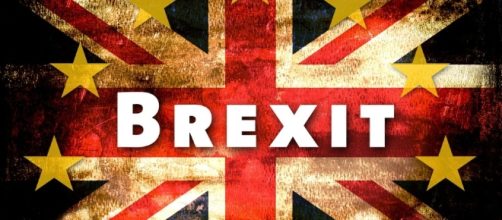'Quandary' would be a word that best describes the follow-up of Germany's elections, this last weekend. When almost every news media in the world reported, as though surprised, merkel's declining support in the voting, one has to ask: Do these media outlets really live in this century?
First things, first. A simple equation could clearly show how a financial crisis, or big-time banking crime, (as seen by many), added to an already indebted European Union. It paved the way to what seems to be the biggest blow for Europe, since 1973.
Furthermore, a simple chart of UK's GDP may well serve as an example, which explains the frustration leading to a referendum in the UK.
For this chart shows an ongoing decline, ever since Britain joined Europe, and that is a pure, simple, fact. Add a refugee influx into the borders and the result was inevitable.
Brexit: Clean up your mess, Europe, and get on with it!
Now, with an unclear path still ahead for the new German coalition, senior ministers, in Whitehall, fear what everyone else felt it would happen, beforehand. As reported by The Times and The Sunday Times, on September, 26, the go-ahead for the next phase of Brexit negotiations, in October, will likely turn out as a no-go.
Delaying it for another two months, hopes may turn into Christmas wish gifts, before the next scheduled European summit, in December. According to the same newspaper, British and European Union negotiators were also unable to produce any result, yesterday, in their first meeting, since Theresa May addressed the world last Friday.
Pledge to pay tens of billions won't buy Britain's access to the single market
Stalling, and dragging it further down the line, does not hide the evidence of a divided Europe. The far-right AfD party was clearly the winner in the German elections. They achieved third place which allows them seats in Parliament. It is of the utmost importance to mention that one of its senior members is set to address Ukip's annual conference on Friday, as the two parties establish ties.
Connecting the dots, here - former Ukip leader, Nigel Farage, addressed an AfD rally in Berlin, earlier this month. In that sense, it becomes quite clear the pertinence for, at least, solving "past commitments" debts, and clear the way for further negotiations.
Brexit: In the meantime, new elections not to be ruled out in Germany
The plain truth is that Germany is Europe's flagship. Without unanimity among the block, it is only fair to ask, where does the UK stand in all this?
Well, UK may obviously stand still, waiting, as Germany tries to understand where it really lies. With the Green party demanding further EU integration, while the FDP believes Greece should leave the eurozone, altogether, it becomes clear that the path is stormy for Europe, let alone the UK.
A very realistic interpretation is that new elections are not to be ruled out, says Klaus Wohlrabe, an economist at Munich's Ifo economic institute, as German business confidence deteriorated unexpectedly before the election.
With no simple conclusion, slow stepping would already be a start, one might say. Unfortunately, no one seems able to take that first step.


